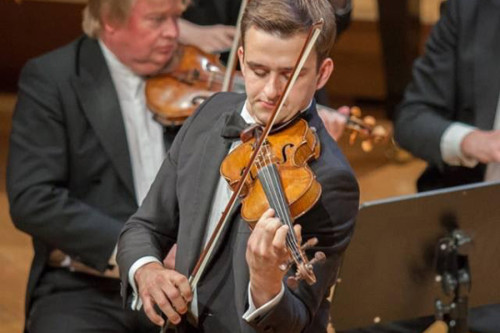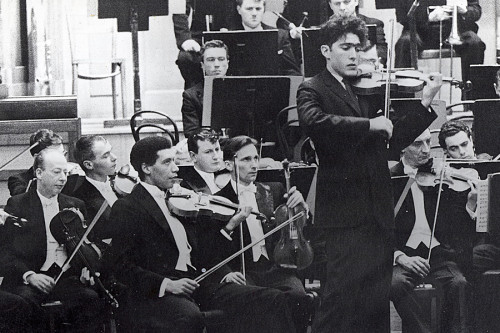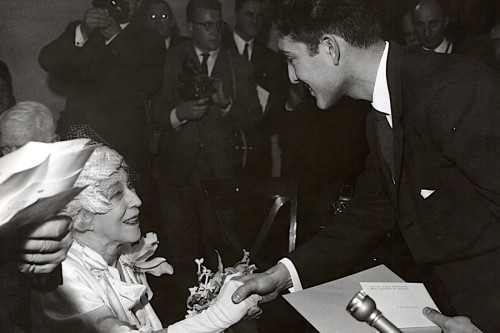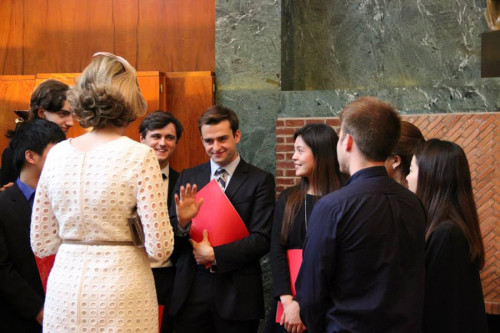
Competition
August 1, 2015
Will Hagen, an impressively gifted young violinist, has just won third prize in the 2015 Queen Elisabeth Competition for classical violinists. Named after Queen Elisabeth of Belgium and established in memory of her good friend concert violinist Eugene Ysaÿe, the Queen Elisabeth Competition is considered one of the most challenging and prestigious in the world.

Will Hagen performing at the 2015 Finals.
Will, who studies at the Colburn School with the distinguished violin pedagogue Robert Lipsett, has also occasionally played for me in my role as a chamber music teacher at the school. Working with and talking to Will directly before he left for the competition inevitably brought back memories of the time I competed in the same competition more than fifty years ago. I couldn’t help smiling when he garnered the bronze medal and third prize, for it was the very same one I had received in 1963.
I was overjoyed with Will’s success—not that I was very surprised. He is a masterful violinist, a sensitive musician, and a charismatic performer. Will’s kind of playing can give a listener goose bumps.
But that said, there was no guarantee that Will would do well at this or any other competition. Talented young violinists sometimes don’t even make it past the initial competition screening process. Unlike, say, a mathematics competition, there are no right or wrong answers in music, no standardized good or bad way to perform. A judge at the Queen Elisabeth might have given Will high marks for his sensitive Mozart performance while another considered it overly precious. One judge might have loved Will’s Tchaikovsky Concerto, another might have found it too slow or too fast or not emotional enough or way too emotional.
In Will’s case, however, there was apparently little disagreement among the judges about the quality of his playing. Bravo, Will. Still, I wonder what Will hoped to accomplish through this competition? What were the dreams that undoubtedly prompted the hundreds of hours of practice necessary in order for him to learn the competition’s vast and demanding required repertoire?
These questions were probably the same ones I had asked myself when I was a contestant. A few lucky young players find a sponsor who can open the right doors and finance the beginnings of a career. For the rest of us, winning a top prize at a major international competition offers the lure of public recognition, money, concerts, and the far less tangible possibility of enlarging the web of musical connections that move a career along.
I had won the Leventritt International Violin Competition while finishing music school, which gave me the extraordinary experience of making solo appearances with six major American orchestras. In entering the Queen Elisabeth Competition a few years later, I hoped it would be the second-stage rocket that thrust me into a successful concert career.
I’ve never worked as hard or as long for anything either before or after. The entire summer before the competition was devoted to studying most of the required repertoire with the venerable Hungarian violinist Joseph Szigeti, and during the months leading up to the competition, hardly a day went by without hours of practice—this despite the fact that I was then assistant concertmaster of the Cleveland Orchestra. I had told George Szell, the orchestra’s conductor, after he offered me this auspicious position, that I would sign the orchestra contract only if he granted me a month’s leave for the Queen Elisabeth. Szell thought this brazen request over for a few seconds and then, fixing me with a steely gaze, he surprisingly agreed on one condition: that when I arrived in the city, I partake of Brussels’ renowned moules marinières—mussels cooked in leek, shallots, garlic, and white wine.
The moules marinières were indeed unforgettable, as was the city of Brussels itself, and especially my supportive host family who provided me with all the comforts of home plus a guided tour of Belgium and its history. All rounds of the competition were open to the public and it was soon evident that the Belgians were not only music lovers but gamblers as well. Many put money down on their favorite contestants and I learned much later that one had bet an expensive bottle of French wine on me winning a top prize. The Belgian press embraced the event as enthusiastically as the public. I was asked by a reporter what instrument I played, and when I told her in my miserable French that it was a Strad (as in Stradivarius), she mercilessly mimicked my American accent on the radio: “Monsieur Steinhardt joue un Straaaad.”
I had worked my tail off and dreamed of glory all those months leading up to the competition, but a new reality set in when all the contestants gathered the day before the first round to be assigned numbers and to draw lots for their order of appearance. A few were Americans I knew well but most came from every other corner of the world. They were not only my competition but also part of our special fraternity of violinists who had already attained a substantial level of excellence and who were about to devote the rest of their lives in the service of music.
I played well enough before a distinguished jury that included David Oistrakh and Yehudi Menuhin to make the final round along with eleven other violinists. From that point on, we twelve were housed, fed, and literally imprisoned in the Queen’s Chapel without any contact to the outside world allowed. On day one, each of us was handed a copy of a concerto specifically written for the competition. We were expected to learn and perform it in one week along with other repertoire at the finals.
Everyone practiced from dawn to dusk, the chapel sounding like a beehive on steroids. There were breaks only for sleep and meals—four Americans and an American-trained Japanese on one side of the table facing four Russians and a Russian-trained Japanese on the other side, with a Syrian and Israeli inevitably sitting at opposite ends. 1963 was the height of the Cold War and yet we managed to communicate playfully across the table—often using Yiddish as our lingua franca.
Then, after an anxiety-filled sleepless night before my final performance, the moment came for me to walk on stage before a packed house and show in the next hour what all the work and planning had produced.

Arnold Steinhardt performing at the 1963 Finals.
I look forward to hearing from Will about every aspect of his competition experience—how he felt he had played, what the other contestants were like, the funny things that happened, the stressful times, his chapel “incarceration”—but especially about that particular moment of the last round when he walked onto the stage at the Palais des Beaux Arts in Brussels. I imagine that the hundreds of hours of preparation and the prizes themselves probably disappeared from his mind and that the esteemed judges became merely music lovers blending with the rest of the audience waiting expectantly for his performance. I imagine that at that very moment the Queen Elisabeth Competition was no longer a horse race with prizes as Will, standing before the orchestra, lifted the bow to his violin and played his heart out.
I imagine this for Will because it was certainly this for me. In that moment all cares miraculously dropped away and I was no longer a contestant but simply a musician trying to convey the brilliance and beauty of the music as best I could.
And then, it was a horse race with prizes after all. I shook hands with the venerable and aged Queen Elisabeth on stage as she awarded me the bronze medal, just as Will did most recently with the present queen of Belgium. After the competition, I performed many times as soloist with orchestra and in recital throughout Belgium as Will is undoubtedly doing now.

Arnold Steinhardt accepting third prize from Queen Elisabeth.
But what about that second-stage rocket that a major prize is purported to be? These days, competitions have sprouted up around the world like mushrooms. Rather than a rocket, call a prize only a possible stepping-stone towards a burgeoning career. The Queen Elisabeth was a memorable experience for me but really only a stepping-stone in an unexpected direction, if even that. Within months, four of us had formed the Guarneri String Quartet, which performed on the world’s concert stages for the next forty-five years.
As for Will, let’s hope the Queen Elisabeth Competition is a giant stepping-stone in whatever direction he wants it to take him. Whether he pursues a brilliant solo career, becomes concert master of a major orchestra, forms a string quartet, or surprises us all by joining a heavy metal rock band, I don’t worry about him.
Will’s kind of playing can give a listener goose bumps.

Will Hagen accepting third prize from Queen Mathilde.
Subscribe
Sign up to receive new stories straight to your inbox!





































































































































































Comments
Hey Arnold, so great to get a hit of you and your stories that you tell sooo well once a month. Hopefully we’ll get to see each other in person sometime soon this summer.
All best,
w
Dear Arnold, I loved this one. May Will dazzle the world for as long and as well as you have. Xox. K&C
Again and again you bring us into the deeply internal aspects of music for the performer. And having heard you, complete with proverbial goose bumps, what a great pleasure it is to be counted among your friends and able to read your wonderfully insightful vignettes, given with Arnold’s usual depth and flourish.More, more…
Love Sonya
What a wonderful article about both Will and your own experience. So beautifully written!
Very interesting Arnold.
Do you know how the careers of the first two place getters went by any chance?
Steinhardt continues to perform throughout the world and has made many recordings as soloist and with the Guarneri Quartet, about which he has written the widely acclaimed book Indivisible by Four. Mr. Steinhardt teaches at the Bard College Conservatory of Music and the Colburn School of Music; he joined the faculty of the Curtis Institute of Music in 1968.
Recipient of Honorary Doctorates from the University of South Florida and Harpur College, Arnold Steinhardt has also received an award for distinguished cultural service from the City of New York presented by Mayor Koch.
Leave a Comment
*/